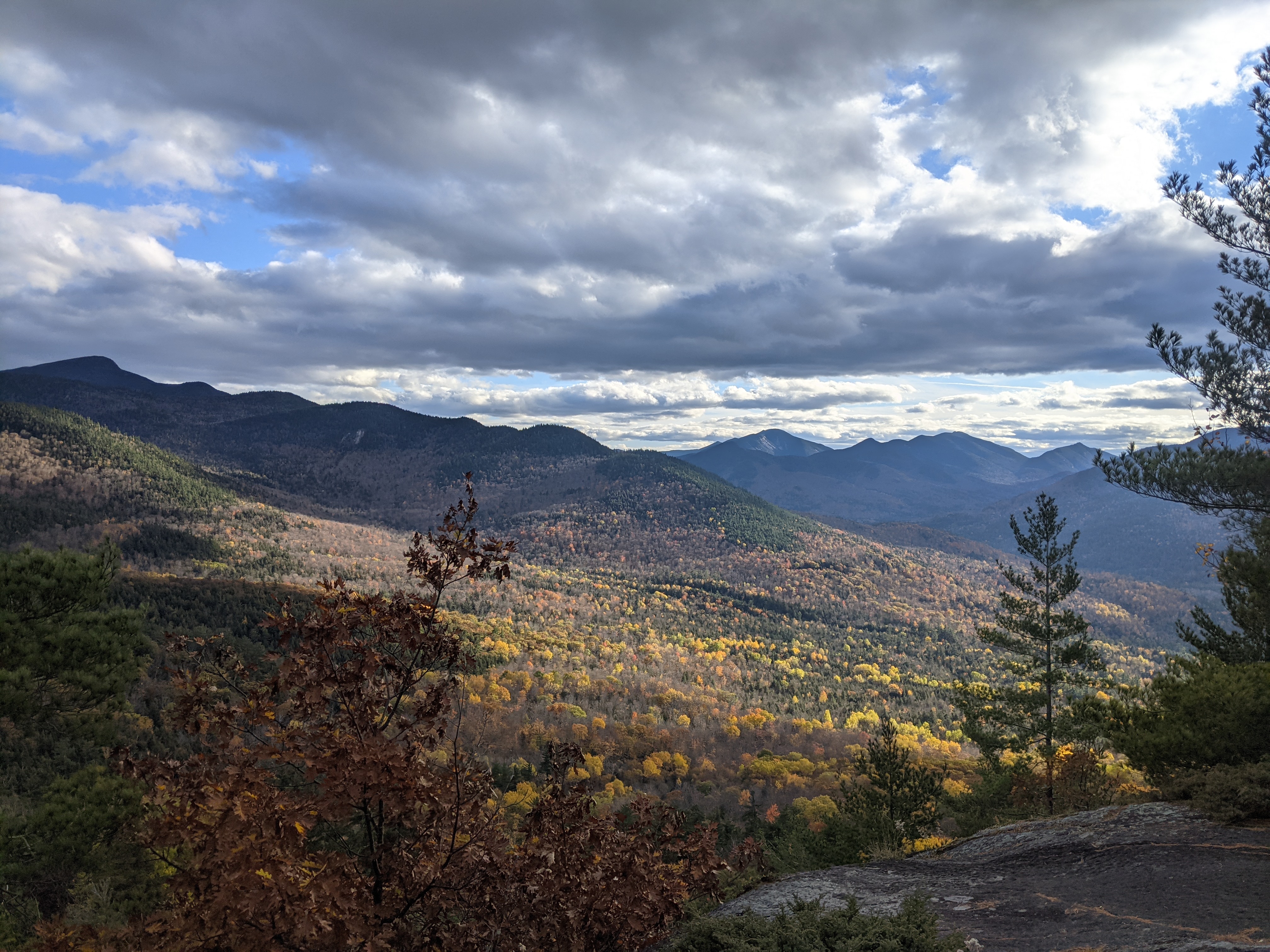Recently
Monday November 1, 2021 — Upper Jay, New York
 This is the view from the top of the mountain we can see from our backyard, which we climbed without a trail, walking directly from our house. The forest on the way there was almost entirely unmanaged, and it was lovely to walk through a place so undisturbed by humans.
This is the view from the top of the mountain we can see from our backyard, which we climbed without a trail, walking directly from our house. The forest on the way there was almost entirely unmanaged, and it was lovely to walk through a place so undisturbed by humans.
For most of this month, I’ve been in the Adirondacks, which are beautiful and lovely. Nominally, I was going to work on some programming projects this month, but instead I’ve largely ended up reading, thinking, talking to people, and writing, which I’m quite happy with.

One thing that I’ve been thinking a fair amount is the way that I want to relate to dating and “romantic” relationships. I’d been, like many other people, mostly taking a break from dating for the past two years or so. Now that I’m thinking about getting back into it, I’m trying to reevaluate what I’m looking for, how to think about the process, and other such things.
My high-level views haven’t changed much — The short instructional manifesto for relationship anarchy pretty well describes a lot of my leanings, but some more subtle details about what I’m searching and hoping for have changed.

I think probably the biggest thing that I’m placing more importance on at the moment is having relationships that can survive being distant for a while, and come back just as strong. While there’s something to be said for making commitments, my life is currently structured in a way where I often end up running off to focus on something alone for a few months at a time every so often, so I’m trying to focus on relationships that are compatible with that sort of lifestyle.

In terms of technical projects, I have a few things going on.
I spent a while thinking through (and prototyping) a linux distribution that I’d describe as being like NixOS but without a custom programming language, and like Qubes but with namespaces instead of VMs. The idea was to use .deb packages, and use overlayfs and bind mounts to allow for installing multiple versions of the same package, instead of nixos-style $PATH hacks. This “works,” but overlayfs doesn’t like really big stacks of overlays, and has some pretty weird failure modes once you start pushing the limits of things. I still think this is a good idea overall, but I’m not planning on pursuing it more at the moment.

I paired with someone on a pretty early cryptopals challenge, which got me sucked back into working on them myself. I left off halfway through set five in late 2019, and picked back up. I forgot how much fun this sort of thing is, I was pretty immediately sucked in and just started working on it all day. So far I’ve implemented some attacks on SRP, and am in the middle of RSA stuff now. I’ve been feeling a bit melancholy about the state of crypto — I really love falling down the abstract math rabbit hole, but knowing that it has important and practical applications, but so much of crypto these days is cryptocurrency bullshit. I just want to do math to stop surveillance, but so many people in the crypto community are just doing boring blockchain scams. I was talking to a friend about ZKPs, and I realized that when I first read about them, they were impractical but exciting. Since then, they’ve become practical (via SNARKS and similar), but I forgot about the excitement, since most of the applications I see these days are cryptocurrency, which is, on the whole, a pretty boring application of ZKPs.
I’ve also more generally been wanting to see more reality-based writing about cryptocurrency. I think that almost the entire field is bad, but most of the critiques of cryptocurrencies/NFTs/etc are very lazy and not technically-grounded. Paul Butler’s recent article “Betting Against Bitcoin” is an example of the sort of thing I’d like to see more of.

I’ve been starting to get interested in some biomed topics — it seems like an important field, and I’d like to set some groundwork for myself to be able to understand it.
The main thing I’m trying to understand right now is 5-HT metabolism, and whether 5-HTP could be a effective treatment for some types of depression — I’ve been reading through the studies that have been done on this, and it’s surprising that there are so few. The first study to test this in 1971DOI: 10.1007/BF00422612 wrote that their sample size was so small because “5-HTP is exceedingly expensive,” which was presumably the case in 1971, but definitely is no longer true — no one has run the study with a larger sample size since, though.
The other thing I’ve been looking into is genome sequencing — it makes sense to me that healthcare providers having access to full-genome sequences of patients could allow them to prescribe treatments more effectively,I’m also trying to be mindful of the fact that many things are not genetic, and historically there have been many places where people have overstated the impact of genetics, to disastrous consequences. I want to do more writing about this at some point, since developing a good framework for thinking about these things seems hard but important. and the costs seem to be going in the right direction for it to become ubiquitous, but the privacy risks are pretty severe, particularly given the instability of the health insurance regulatory system in the United States. I don’t have a lot of thoughts on this yet, but I’ve been looking into getting my genome sequenced and writing some code to deal with all the data, which seems like a pretty reasonable place to start.

Over the past few months, I’ve been reflecting on the extent to which gendered socialization as children can affect people’s personalities into adulthood. At risk of being overly reductive, I think many kids in the United States are largely taught or implicitly expected to fit into either hyper-masculinity or hyper-femininity, and then find that their process of becoming a whole person as an adult is primarily the process of unlearning that socialization. This is hard to talk about, though, for a few reasons:
- It can be difficult to talk about gendered socialization while also respecting that that socialization may be very different from how someone sees themself.
- Expectation around gender are very culturally dependent, even within the United States.
- It’s unclear that thinking about this sort of thing in terms of gender is actually useful — I speculate that it probably is in many cases, but it could be that it more useful to break it down along other axes.
Either way, though, I’ve been enjoying talking with a few friends about their gendered socialization, the ways in which that’s influenced them into adulthood, and which parts people want to hold on to and which they want to unlearn.

I’ve been reading a pretty good number of books this month:
- A Libertarian Walks Into a Bear by Matthew Hongoltz-Hetling: This was a really, really excellent read. It’s mostly a history of both the Free Town Project and bears in the area around Grafton, NH. My understanding about the Free Town Project going into this book was very simplistic — some people tried a thing, it fell apart for unclear reasons. Now that I’ve read this book, I have a much better understanding of the details of how and why the project failed. This book also contains the best takedown of libertarianism I’ve seen — the chapter is “Unlocking Utopia,” and it stands well on its own if you’re interested in reading just that part of the book.
- Evocative Objects edited by Sherry Turkle: I first put this book on my list because the phrase “evocative object” popped into my head out of nowhere, so I searched for it and figured if there was a book about that it was probably worth giving a look. The thing that spurred me to actually read it, though, was a friend doing research on learning and pedagogy mentioning that they like Sherry Turkle’s work and writing a lot. I’m a bit more than halfway through, I’ve found it pretty enjoyable, although the essays are a little hit-or-miss.Ones that stand out in my memory are: Carol Strohecker on Knots, Michelle Hlubinka on The Datebook, Irene Castle McLaughlin on The Bracelet, William J. Mitchell on The Melbourne Train, Trevor Pinch on The Synthesizer, and Stefan Helmreich on The SX-70 Instant Camera.
- Polysecure by Jessica Fern: I’m running a reading group for thisLet me know if you’re interested in joining! — so far it’s been better than I expected: particularly, it took a lot of care to add caveats and nuance that is often lacking in writing about attachment styles. Part One is the best explanation of attachment styles that I’ve seen so far.
- Cultish by Amanda Montell: I saw this book at the Brooklyn Book Fair and picked it up on a whim — I expected it to be a little trashy, but I like trashy reading about cults, so I figured I’d give it a go. It surpassed my expectations by a huge margin — the thesis of the book is that the fundamental way that cults operate and exert control is via language, and it provides a lot of solid, albeit somewhat circumstantial evidence for that idea.
- The Ones Who Stay And Fight by N. K. Jemisin: I read this at the recommendation of a friend after re-reading The Ones Who Walk Away From Omelas (which I absolutely love), and it gave me a lot to think about. I’m still processing it, but I definitely recommend it. (They’re both short stories, you could get through them both in probably less than an hour)
- Debt by David Graeber: I’m still working through this — it continues to be excellent, although I think I’ve probably gotten most of the most important details, and am hitting some diminishing returns. There are two bits that stand out in my memory. First, the connections between bridewealth, blood debt, and slavery. Second, the idea that cultural fabric is woven from small debts that will never be repaid exactly, and that repaying a debt exactly (rather than giving slightly too much or slightly too little) is something of a slight, since it means that you are trying to cut off your connection to that person.
- Bird by Bird by Anne Lamott: This is well written and interesting. It largely talks about a type of writing that I’m not very interested in doing, but it’s still a good read.
- The Grammar of Graphics by Leland Wilkinson: I’m reading this because I want to at some point make a statistical charting tool that doesn’t suck. I’m very early on in this book, but it’s quite good so far, and it’s clear that the author has spent a lot of time thinking about this topic, and has distilled a lot of useful insights in this book.
- Fully Automated Luxury Communism by Aaron Bastani: I’ve only read the introduction so far, but it seems very promising.

In terms of online articles, here are some I found particularly interesting, insightful, or enjoyable:

In the coming month, I plan to be in NYC for a few days, then San Francisco for a week or so, and back to Taipei after that. Let me know if you’re in one of those places and want to get together!